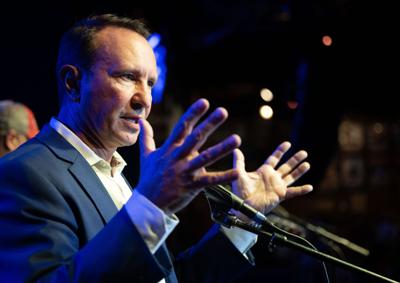As David Vitter frantically tried to reverse the momentum that was carrying his gubernatorial opponent John Bel Edwards toward a decisive victory in 2015, the Republican U.S. senator cut an ad reminding voters that “you know me.”
That, of course, was a big part of Vitter’s problem. Voters did know him, and in choosing the lesser-known Democratic legislator, they made it clear that to know Vitter wasn’t to love him.
Two Edwards terms later, the biggest question in the current governor’s race is whether voters feel the same way about this year’s best-known and potentially least-loved candidate, Republican Attorney General Jeff Landry.
A new poll from The Times-Picayune | The Advocate and other media and nonmedia organizations suggests otherwise — so much so that the results paint a daunting picture for those who hope an Anybody-But-Landry movement will solidify.
Landry is the front-runner in this poll, as he has been in all of the others, with 36% support from the 800 likely voters interviewed earlier this month by Faucheux Strategies. In second, as usual, is Democrat Shawn Wilson, Edwards’ former transportation secretary, with 26%. Lagging far behind are independent lawyer Hunter Lundy with 7% and four Republicans: former business lobbyist Stephen Waguespack with 6%; Treasurer John Schroder with 4%; state Sen. Sharon Hewitt with 3%; and state Rep. Richard Nelson with 2%.
As discouraging as those totals are for most of Landry’s opponents, another finding from the poll makes their plight even worse.
It’s that Landry, like Vitter before him, is known — so much so that 78% of those interviewed expressed an opinion of him, compared to 17% to 34% for his opponents — but is not particularly disliked.
Half the respondents interviewed said they have a favorable opinion of Landry, including 71% of Republicans, 48% of independents and even 27% of Democrats, and just 28% overall said they view him unfavorably.
To what I’m sure is the deep dismay of his opponents, as well as the prominent Republicans, Democrats and independents hoping to unite behind a viable Republican who is more moderate in approach if not philosophy (on the theory that voters are unlikely to send a second Democrat in a row to the Governor’s Mansion), those are strong numbers. Really strong. They're the opposite of what you'd expect from a candidate who is widely assumed to be deeply divisive.
Instead, they suggest that, unlike Vitter eight years ago and unlike Landry supporter Donald Trump's position in the national electorate, he’s not sufficiently unpopular for an anti-Landry movement to come together organically. To change the race’s overall dynamic, Landry’s critics don’t just need to help voters decide what to think of him in the first place but to change a lot of minds.
Like any poll, this one is a snapshot of where things stand in a given moment. Seven weeks out from the primary and a month before the start of early voting, there’s still time for Landry’s opponents to paint an unflattering picture; to highlight his questionable business deals and AG office controversies, and whatever else their opposition research has turned up; and to remind voters that he’s far more focused on criminalizing doctors and cracking down on teachers and librarians than on stemming the state’s outmigration and fixing its insurance woes.
One key question that the poll doesn’t answer is whether all those voters who approve of Landry know about these things, don’t know, or don’t really care.
Memo to all those candidates down in the single digits — and the donors still hoping for a GOP alternative: There’s only one way to find out.

